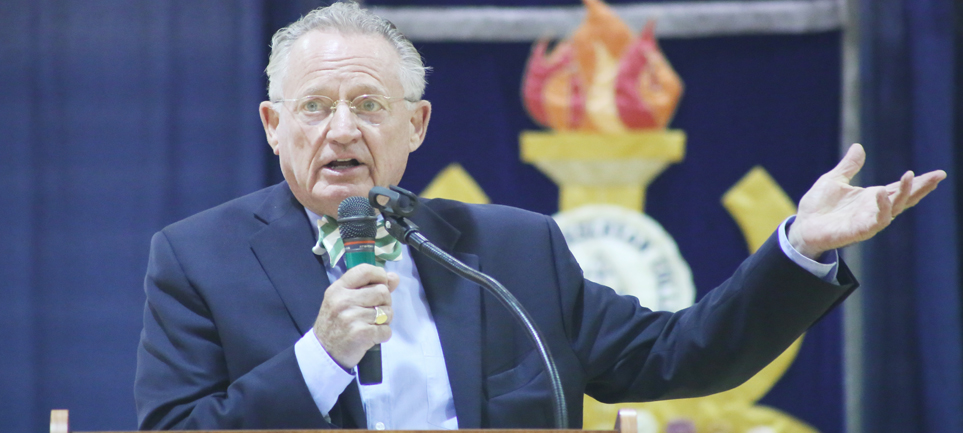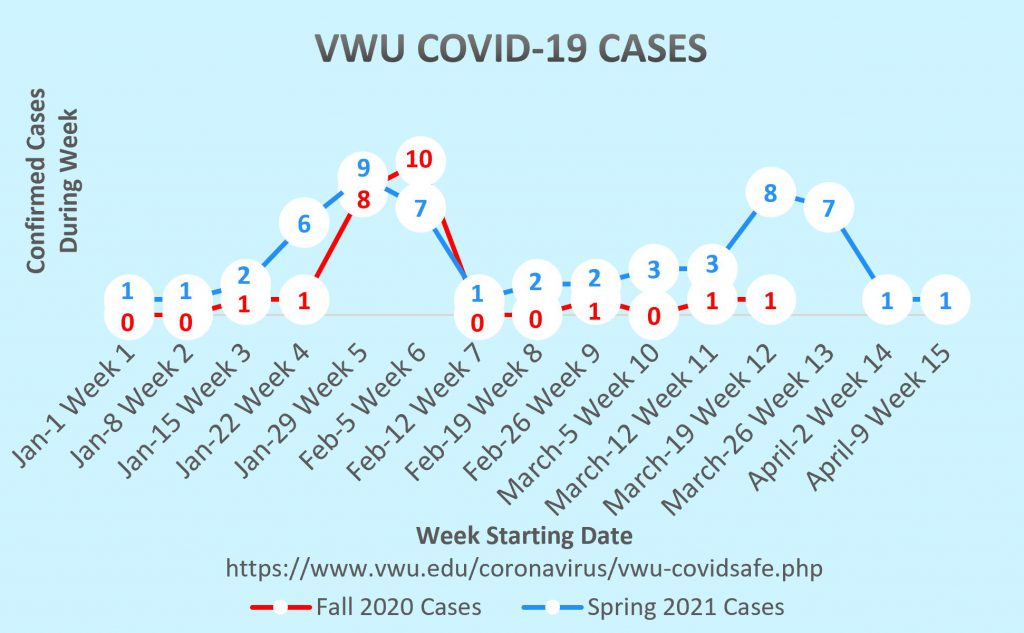Isaac Fick|Marlin Chronicle
President Scott Miller gives answers, background to the changes around campus, citing the philosophy to move forward or fall behind.
Due in part to the Virginia Wesleyan Campus Master Plan, President Scott Miller said that aside from the institution’s founding years, “the last 10 years have been the most transformational years in the history of Virginia Wesleyan.”
Miller said that campus growth often awaits funding that can support it, and in recent years, the university has secured the donorship to move forward with upgrades, modifications and additions.
The Campus Master Plan, introduced by Miller upon his arrival at VWU, has led to existing and future projects throughout the 2016-2026 period, including the Athenaeum.
“All we had to do over a 10-year period was find the funding to make it work,” Miller said, and they found that funding this year.
“The original concept for the Athenaeum came out of the master planning process in 2016, and the process included our outside facilitators asking faculty, staff and students about what the library of the future should look like,” Miller said.
With these considerations in mind, Miller said, “The library of the future is more of a learning center overall than just a place that collects books.”
Director of Civic Engagement and Service Learning Bethany Smeeton moved into a newly added office as a part of the Athenaeum. Smeeton said it “offers unique opportunities that enhance the student experience, supporting both academic growth and professional development.”
Smeeton expressed optimism about new possibilities resulting from the changes. “This vibrant new space will inspire collaboration, foster creativity and provide students with the tools and resources to thrive in their academic and professional journeys.”
Although many components of the Athenaeum’s transition have concluded, Miller said more changes are in the works for the library. For example, the 24-hour study area will be known as ‘the study’ and serve more functions. Accommodating the university’s transition to including e-textbooks in tuition, it will have additional computers, according to Miller, which will particularly benefit students who don’t have laptops to read their e-books.
Regarding textbooks in tuition, Miller said students will have the option to keep the book and refer to the notes they took within it to prepare for later use like licensure exams.
Miller said hopes for the Athenaeum have been realized, with one exception: “there was a hope that there would be a satellite location for a Starbucks.”\

Isaac Fick|Marlin Chronicle
With the move from Lighthouse to Athenaeum, select Student Success offices moved from the Learning Center to the Lighthouse, making space for new resources in the Learning Center, such as a space designated for the neurodiversity grant from a year and a half ago.
In addition to this, Miller described development from Student Success in the form of grants designed for underrepresented student populations and added staffing for the department.
Miller spoke about opportunities with the Virginia Museum of Contemporary Art (MOCA), a project he said three donor families collaborated on.
It will provide “the most modern and largest classrooms on campus,” Miller said. He also anticipates meaningful employment opportunities there for students while getting their degrees.
Iyonna Valentine, senior and current Art major, who will start the master of Education program at VWU this summer, said, “I am still excited about MOCA opening even though I’ll have already graduated by the time it’s completed.”
Valentine said she believes the MOCA will “transform the way students, especially Art majors, experience art education.”
Miller spoke on how internship opportunities at the MOCA will support the newly added Master of Arts program in art leadership. For students getting both bachelor’s and master’s degrees in related programs, Miller said this is a resource that VWU students can benefit from.
Valentine said she hopes for “hands-on opportunities like internships, workshops with professional artists, maybe even chances to help with exhibits or community outreach, for students and maybe even alumni.”
In reference to another master’s program in progress, Miller said the university is adding Psychology, “because our undergraduate degree in Psychology has been so popular.”
Miller referred to Goode, MOCA, DeFord Manor, Birdsong Field and Coastal 61 as “a beautiful front porch” for the campus. “Each of those facilities play a unique role in the types of programs that we offer to our campus community, and we’re proud of those developments,” Miller said.
“This summer, we’ll also be investing 10 million in some of the less visible projects on campus,” which Miller said includes replacing roofs, new heating and cooling systems, bathroom updates and basic upkeep. He said the intention is to complete the bulk of these projects while most of the residential population is not on campus.
In the realm of Marlin sports, Miller expressed excitement for Women’s Flag Football beginning their first season in Spring 2026, and explained why the university has not implemented men’s football. “We’ve always had the philosophy here that men’s football […] drains resources, and if you want to watch college football, go watch it at a division one school. But we’re not going to drain our resources on it,” Miller said.
Regarding residence halls, there are planned projects that have yet to enter the implementation phase due to funding.
“At some point in the coming years, we’d like to build a new residence hall, somewhere around 128 beds,” which Miller said would likely be built on Rose Lawn. “But there will be a need in the coming years to look at something as the usefulness of Village One reaches its maximum age and capacity.”
The reason this project has not been started, according to Miller, is because “we have to find funding for it, and we really haven’t identified any donors that are interested in supporting a project like that. So while we wait to do that, we continue to put money into upkeep of some of the older residence halls, primarily Villages One and Two.”
Additional townhouses in Honors Village are also part of the plan. “If you’re wondering why there’s a grassy area from the back of the three on the parking lot side — that is designed for three additional townhouses to be added there,” Miller said. “So pre-stubbing for utilities is already there.”
This project’s start has not been seen for the same reason: “It’s a matter of finding the funding to build three additional residence halls,” Miller said.
“While a lot of schools in the west of Virginia […] are struggling with enrollment issues, we’re not,” Miller said. “We’re not because we develop new, creative, innovative things that are what the students of the future are looking for.”
Noting that 104 of the top businesses in the country are in Hampton Roads, Miller said, “that means every student in every major, if they want an internship before they graduate, there’s an accessibility to these top businesses.” He said this access is deeply tied to the university’s success.
By Isaac Fick & Lily Reslink



